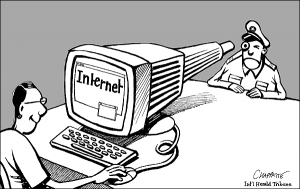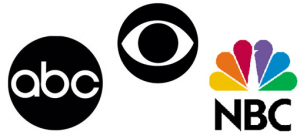Libertarians – me included – have wrestled long and hard with this one: Is it censorship when private entities do it?
No – not in a legal sense. Because these private entities do not have the power to forbid publication, per se.
But they do have the power to suppress (and even to punish) publication when the entities at issue effectively control the means of publication – and so it amounts to the same thing as censorship.
It may even be worse, since one can always get around government censorship (see, for example, the underground Samizdat press in Tsarist Russia or, later, the anti-communist press in East Germany and Poland).
But how does one “get around” private control of the all-encompassing Internet and related “social media platforms”?
There is no alternative Internet – nor is one (given present technology/infrastructure) even conceivable, regardless of one’s financial ability.
Suppression of speech via private entities is a new – Internet Age – issue.
Before the Internet, a relative handful of media organs – the big chain newspapers and their wire services, the three major TV networks – dominated the media. But it was perfectly possible to publish outside of their control and without legal or financial repercussions.
They could not prevent you from publishing.
One might start out with leaflets or with a small-scale newsletter. One could also conceivably launch (or buy) an existing newspaper or magazine and secure advertising based on circulation.
While the majors did control the preponderance, they did not control everything and the key point is there was always the possibility that an upstart newspaper or magazine or TV station would upend their proverbial applecart. May did so.
There are several examples:
In print media, there is – well, was – The Washington Times (where I once worked as an editorial writer and columnist) which established itself as a counterpoint to the very establishment, very left-liberal Washington Post – and on the Post’s very turf. There were boxes selling the Times on the same streets where there were boxes selling the Post.
All that was necessary was someone willing to invest in the physical resources – the building, press equipment and so on – and pay a staff to produce the thing. In this case, it was Rev. Moon. Critics have always used that fact to browbeat the Times – but the point is that anyone with resources and the desire to do so could launch a large-scale paper outside the orbit and control of the major establishment media.
In radio, there still is Howard Stern – who utterly changed the nature of talk radio.
Whether you like the changes he forced is immaterial. He was able to do it because he wasn’t prevented from doing it, is the point. All it needed was a station willing to hire him – and to broadcast him.
The airwaves weren’t closed to him.
On TV, there’s Fox News – and also CNN, even. Both started with almost nothing and became – if not everything – a very big something. Each was able to carve out a new niche – eventually, quite large niches – on the almost limitless and available space that had opened up on the new medium of cable. And which was open to anyone with the means and willing to make the investment.
Entry wasn’t free. But there was a free market.
No one was legally prohibited from publishing by government edict, which would be the technical/correct definition of censorship.
And none were prevented from publishing by private entities which had it in their power to make it impossible for them to publish because they controlled every medium of publication.
The New York Times did not own every single printing press – every typewriter – in the country. A physical newspaper is a physical newspaper and can be sold (and mailed and otherwise distributed) just the same as any other.
ABC and CBS and NBC could not prevent Fox and CNN from launching new cable TV channels.
The government did try to censor Howard Stern – via the Federal Communications Commission – but Howard was able to end-run government censorship by moving over to satellite radio.
Today – in the Internet Age – things are very different.
A small handful of interlocking privately owned mega-corporations have the power to suppress publication (more here) of any point of view – written, verbal or visual – they dislike by dint of their control over the medium of its dissemination, the Internet and related “social media platforms.”
One cannot buy a new Internet to compete with the existing – and only – Internet.
One could launch new “social media” venues – and heretical voices (these include Joe Rogan, Adam Carolla and my friend Tom Woods) have gone Podcast as a way to end-run the corporate control over Internet publishing.
But all are vulnerable to suppression by the entities which control the Internet, who are also the same entities who control it monetarily – via their control over advertising and (most recently) their control over online financial transactions.
This latter thing is a very ominous development.
Podcasters – and contrarian web sites – have been able to survive in the emerging neo-Stalinist digital gulag by relying on the direct support of their audience, which does so via online payment mediums (PP, etc.). But these have recently begun cancelling the accounts of publishers they deem “offensive or who have “violated” inscrutable “terms of service,” which are never clearly defined but amount to – If we decide behind closed doors that we don’t like you we will stomp you and will do so at any time, at our pleasure and without ever telling you exactly why. More on this here.
And then what?
There is no Internet Samizdat – nor can there be. There is just the Internet, which is the only known means for the dissemination of information in the digital age.
There is also the fiction that the handful of entities which effectively control it and all the critical peripherals – which includes both “social media” and online advertising and online payment mechanisms- are private and so we can’t – as Libertarians – object to their machinations.
They may be privately owned, but so is Tesla – and it is very Libertarian to object to the rent-seeking and crony-capitalism of Tesla. Because Tesla – and the online entities under discussion – leverage the government for their private gain.
Where, after all, did the Internet come from? Was it the privately-funded creation of Goo-gul? Or did Goo-gul, et al, exploit what the taxpayers had been forced to finance the development of?
At the least, we are due some kind of refund.
What’s happened is even more obnoxious than what Jefferson wrote about being forced to provide money for the distribution of opinions one finds repellent – because it’s not just that. One is also precluded even from using one’s own money – whatever’s left, after all the tiers of government theft – to publish opinion contrary to the opinions one finds repellent.
Lech Walesa, phone home.
. . .
Got a question about cars – or anything else? Click on the “ask Eric” link and send ’em in!
If you like what you’ve found here please consider supporting EPautos.
We depend on you to keep the wheels turning!
Our donate button is here.
If you prefer not to use PayPal, our mailing address is:
EPautos
721 Hummingbird Lane SE
Copper Hill, VA 24079
PS: Get an EPautos magnet (pictured below) in return for a $20 or more one-time donation or a $5 or more monthly recurring donation. (Please be sure to tell us you want a sticker – and also, provide an address, so we know where to mail the thing!)
My latest eBook is also available for your favorite price – free! Click here. 













Are they really private? With subsidies, contracts and legal exemptions granted by government they appear to be public private partnerships. Mussolini described facism as the merger of state and corporate power. Is that the real danger?
One of the side effects of the network effect is that there’s a critical inflection point where a competitive network becomes essentially worthless because there aren’t enough nodes to maintain a viable network. At that point the only option is to join the primary network.
If you think about Facebook et al as networks then then network effect plays. If you think about them as nothing more than generic web sites that happen to make it easy for users to post content, there’s no reason why they should even exist. It should be trivial to come up with a rival to Facebook, this site is an example albeit on a smaller scale. There were online “networks” prior to Facebook and one only has to look at China to know there are alternatives out there with just as much activity (https://en.wikipedia.org/wiki/Websites_blocked_in_mainland_China), and soon they’ll have more users as well. Yes, the Chinese Communists are the reason why FB isn’t in China, but I could/should ban Facebook in my house just as easily as the Chinese with their “Great Firewall.” Enough households choose to avoid Facebook and they go away quickly. And huge monolithic communities are the antithesis of modern media anyway. I discovered EricPetersAutos though LewRockwell.com, which I discovered after reading a book by Tom Woods (or maybe Ron Paul), which I discovered from… I don’t recall, but for certain it wasn’t from Facebook. My social network is far more robust than Facebook because it is distributed by nature and individualized for me by me. Lew’s daily digest served as my “friend recommendations” and Eric’s “timeline” is a far richer experience than anything I do on FB -the comments alone being a much deeper conversation than anything seen on Facebook.
We’ve been lucky in the US because no one is going after the ISPs or top level DNS. Comcast tried to throttle traffic years ago (Torrents, and then only if you were one of the top 10% of data consumers in your neighborhood) with deep packet inspection and got summarily smacked by just about everyone. Net Neutrality was the result, although almost no one really knows but NN is really about (hint: if your ISPs network isn’t overloaded Net Neutrality rules will never kick in). The first ISP that blocks access to any web site is going to be lambasted by the media, even when the site exists only for obviously nefarious reasons. And we’re finally getting to the point where options for Internet access exist, with a lot of tradeoffs (cost per Mbit being the main deterrent to alternatives). Of course as long as the telecommunications universe is managed by the FCC anything is possible.
But I think the biggest problem is that Silicon Valley has become a desert of innovation. Mostly due to the Sarbanes Oxley law that makes it nearly impossible to raise money through an IPO until after you’re a well established name. This basically put the kibosh to any VC backing a business plan that doesn’t include getting acquired by one of the FAANGs as the exit strategy because the regulatory costs takes about 4-8% of gross revenue. When your product is something that is complementary to the established players you’re not going to compete. And if you’re going to be a competitor you’re not going to get funded. This is how Patreon and its ilk managed to get a toehold, because sometimes a good idea is still a good idea. Now that crowdfunding has the attention of the VCs they’re being dressed up for acquisition. And no one wants to have that free speech turd in the punchbowl slide in their Powerpoint deck. These things seem to sort themselves out over time, might not be as fast or simple as we’d all like, but when you get obsessed with efficient markets you end up with government controlled monopolies. In fact the markets aren’t efficient at all, at least not for producers. They’re messy, highly volatile and sometimes dangerous. Real marketplaces are full of nearly identical products side by side. And as soon as Standard Oil gets too big, Gulf Oil is created to “fix” the problem. That’s not happening under the highly regulated financial world these days, and might not ever again.
Censorship in the USA works in a special way. Through government licensing, government subsidy, and central bank monetary policy a few dominate corporations arise in every medium. These companies are considered “private” and then don’t allow a real voice to anything which goes against the established order. Because it’s ok when private companies do that.
Meanwhile everyone can still have their news letter sent through the USPS so they aren’t technically censored. They just can’t reach many people.
Even libertarians seem to have a difficult time grasping that the reason why censorship by the bigs is important is because it is government that ultimately made them what they are or maintains them as such.
(modified version of a previous post because it is more appropriate here)
Hi Brent,
Exactly!
When the State outsources censorship to “private” companies, it is State censorship. The recent congressional hearings, clearly an exercise in extortion (censor yourselves, lest we have to), should make this obvious. However, the “extorted” companies deserve no sympathy as they are willing participants. As Caitlin Johnstone correctly observes, “in a corporatist system of government, corporate censorship is state censorship.” A few good lefties, like Caitlin Johnstone, understand that social media platforms collude with government to censor unacceptable opinions, bypassing the legal prohibition on government censorship, while producing the same results. However, their solution, regulate those companies like public utilities, is absurd as it requires believing that the same entity pressuring media platforms to eliminate disfavored thought, will also prevent those media platforms from censoring. This naïveté would be charming were it not so dangerous.
On the other side, the unfortunately common libertarian/free market, “but,… private” dismissal of this indirect State censorship, is equally absurd. Businesses that collude with the political elite, to advance the goals of the State and to advantage themselves, are not meaningfully private. Unfortunately, most of the private, free market is neither private nor free. Any libertarian analysis of this issue must offer some meaningful definition of a private company. At the least, it should receive the vast majority of its’ income through voluntary transactions, refrain from acting on behalf of the State and never solicit firm or industry specific subsidies.
Companies like the GEO group, CCA, Academi (formerly Blackwater) or any similar companies are not “private”. The HFC and ethanol industries, all of the Musk empire and most of the “green” businesses are not “private”. Social media companies, that have received billions in subsidies, lobby for more, and act on behalf of the State, are not “private”. I don’t know the best approach to dealing with this problem but, I do know that the leftist solution, more regulation, and the “but,…private” dismissal by some libertarians are equally ridiculous.
Cheers,
Jeremy
This issue was litigated and settled over a century ago in the Anti-Trust Age, in which the Federal Government legislated, and courts upheld, the idea that constitutionally-protected private property rights and freedom of association could not be used to deny other people (i.e., competitors) freedom of economic association and the right to acquire property by forming monopolies and acting in “restraint of trade.”
So why do all the Silicon Valley tech oligarchs get away with the same behavior that got John D Rockefeller busted??? Simple. During the Progressive era, trust-busters were… progressives! And what are Silicon Valley oligarchs today, pray tell???? Progressives! Advocating for gay rights, gun control, for immigration and “against hate,” and being slavish supporters of Hillary Clinton, has purchased immunity from prosecution for Apple, Google, and Amazon. Let’s put it this way: if Sergey Brin and Jeff Bezos and Bill Gates gave billions to the John Birch Society or funded the Unite the Right rally at Charlottesville, they’d be the subject of antitrust and civil rights lawsuits REAL f–king quick.
Although the censorship and deplatforming by corporate tech oligarchs worries me greatly, what worries me even MORE is 1) censorship and oppressive speech codes in universities, ALL of which are supported directly or indirectly by the government through tax exemptions, direct grants, and aid to students, and 2) the increased willingness of the police to investigate the publication of so-called “hateful” flyers and posters under “hate crime laws.” There have been numerous instances of people engaging in low-rent leafleting getting investigated when people complain about the content. Naturally, it is always so-called “hate groups” on the Right, and never communists or anarchists, who get investigated for putting up posters or handing out flyers.
I myself damn near got arrested once for attending an event to protest a gun-confiscating politician with a poster with a swastika on it, calling the politician a fascist. The cop went after me and I specifically heard him say into his radio that he was going after me because he saw me with a “Nazi sign.” I wasn’t even advocating Nazism, I was calling the politician a Nazi, and this cop was on me like white on rice. Very aggressive and mean bastard and he practically called in the cavalry on me. Had I gotten arrested I probably would have beat the charges, but at great expense to myself, confiscation of my firearms (beyond what the politician had already accomplished) and damage to any future employment by merely having an arrest record. Let me tell you, it was dicey for a couple of minutes. You really don’t even have the ability to protest The System any more — unless you’re antifa, in which case you can burn cars and smash windows and assault people with impunity… because antifa is PART of The System.
Face it, people, we are living in a soft totalitarianism that is going to get a lot harder before long as more and more “deplorables” get red-pilled on the shafting that their overlords are giving them.
Except Rockefeller et al gave us much of progressivism in the effort to establish the one nation and ultimately one world company town. Anyways on your sign people in general cannot comprehend anything that requires the least bit of understanding of history or anything else. It’s a very dangerous condition and it was deliberately created with the school system.
And after the Standard Oil trust was broken up he was even richer, owning shares in every “new” company formed.
This site is literally an example that the control of information that used to be exercised by media giants has been broken. When I was growing up access to such heretical POVs was really hard to find. Now, it’s one search away.
Yeah, it sucks that a particular way of getting paid for your work was cut off. But one of my favorite browser tabs is for a little site written by a single guy in the middle of nowhere. I would never have found his POV 20 years ago.
We can now route around those who wish to control our news and be our gatekeepers.
20 years ago, well more like 25, we had a functional USENET. Of course it’s reach wasn’t so great as the web but mostly because people weren’t online yet. USENET newsgroups had a lot of heretical thought and things media wouldn’t allow. There were also the old BBSes up to the mid 1990s. But like the old mailed newsletter it was about reach.
Hi Ferdinand,
These companies lobbied for, and received, exemption from liability for copyright infringement, slander, libel, defamation, etc… because of their claims to be a common carrier, not a content provider. Which, is a good thing as it was supposed to allow free exchange crippling liability. But, now they edit content yet still claim the “safe harbor” exemption. I think your suggestion is excellent and should be pursued.
Cheers,
Jeremy
Eric: I constantly wonder why a grassroots (libertarian?) movement has not formed behind the idea of using the Internet Giants reliance on “safe harbor” to their detriment. They all rely on the “safe harbor” protection from copyright infringement. But, now, they are exercising “editorial control” and so probably can be held accountable for “infringement”. Any thoughts?